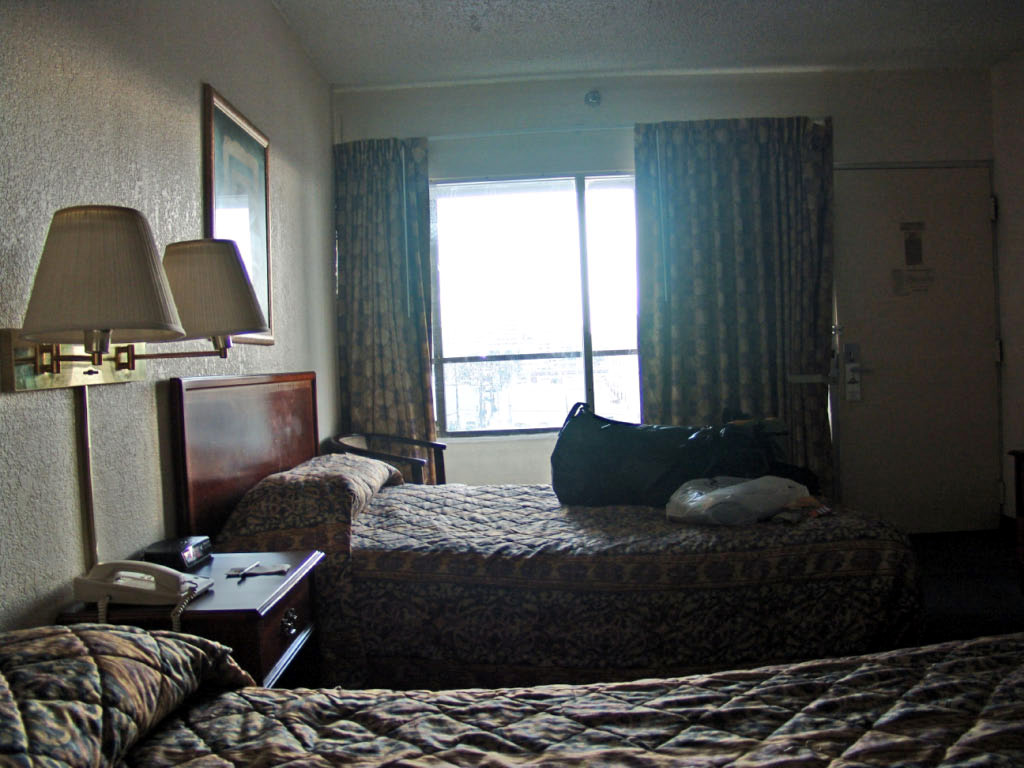Where we stay on exploratory field studies has a big impact on what we learn, the effectiveness of the team working together and being able to gather data we need to get. The preferred options are not as obvious as might first seem.
Pre-trip, one of the first tasks is to figure out what the optimum location will be to run user studies. If the study participants are likely to be traveling around by subway, in what part of the city are they located and where is a good axis point? Personally I prefer to be situated in a pedestrian-friendly location since it makes ad-hoc capturing of observational data that much easier. One method we use to find suitable ad-hoc study participants is to ride a bicycle around the city. Hotels usually allow bike parking near to the staff entrance and getting there is a good excuse to interact with and interview hotel staff members. (try and take a peek inside the security office if you get a chance – they are often located around the back of the building and security people can have interesting perspectives on human behaviour). From recent memory, the Hudson is particularly bike unfriendly.
Booking the flights my travel agent by default books a company recommended hotel usually located to be near to local company offices, airports or manufacturing sites and whilst comfortable are usually pretty lousy as a base for conducting user research (a pleasant exception is the Nikko Hotel here in San Francisco).
The research team tends to spend a lot of time coming and going from the hotel so the difference between a five minute walk and a 15 minute walk to where you do what you got to do – like breakfast meetings or other working space, can result in unproductive hour every day. Sometimes the walk time is good for gathering data, and getting a bit of exercise but I prefer to be given the choice of when and where. If you are hiring assistants paying their hotel even if they live in the city that you are researching has a number of benefits, not least of which is that they can sync and work to the rhythm of the rest of the research crew.
Wi-Fi and high speed internet access is not a necessity given the alternatives that are available, and I would argue that internet access is a distraction. One of the reasons for traveling to a location is to submerge ourselves in the local culture and going online to read up on what is happening back home can take you away from that mind-space.
On a recent road-trip study in the US $19.99 motels were fine for what essentially amounted to a decent night’s sleep and a shower. Different rest stops have different demographics and are a possible source of ad-hoc participants.
Booking a suite in the major hotels or is usually cost effective – since longer studies require a space that can function as a mobile office. It’s not uncommon for cleaning staff to be freaked out by furniture re-arranging and the removal of what ever was hanging on the walls to be replaced by maps of the city and participant profiles. The space afforded by a suite is good for generating a data wall as the study progresses. The data wall is useful for sharing incoming data with the team, highlighting particular aspects, and noting down and sharing ideas and concepts. I recommend the Canon i90 mobile printer with Bluetooth adapter – wireless printing saves a lot of hassle.
At this point you might be thinking that it’s better to stay in the home of the study participants. We’ve done home stay its good for certain studies. However I wouldn’t recommend entering into this arrangement lightly. It can be tricky when you factor in the modern moral, legal, ethical, professional requirements, the need be awake from before participants get up to after they go to bed. A colleague rightly reminded me that anthropologists have been living amongst the people they study for months or even years at a time – it’s true, but I’m not sure they had to jump through the legal hoops we do. I once had to excuse myself from an overnight stay due a combination of the inability to stay awake (severe jetlag) and the home sleeping arrangements (guest-researchers get to sleep on the living room sofa). Even if you stay with participants, double book a hotel room – its useful for storing equipment and as an emergency backup for team members.
My final recommendation is to consider the short stay hotels if you are looking for a place for a couple of nights. They are often conveniently located next to stations, check-in is pared down to a bare minimum – great when you are tired, they often have an emphasis on good bathing facilities and they tend to be quite functional. In Korea I stayed in one for a couple of nights which included high-speed internet access – I’m not sure what the most likely use cases were but imagine it was to play Star Craft or something similar. Minor downsides to short stay hotels include no hanging space for clothes, dim lighting, can’t walk around the building with recording equipment (the whole hotel is considered a private space), and can be noisy early mornings and at weekends. They don’t come with breakfast. And because they are often cash businesses you have to remember to request a receipt. Processing the expense claim is fun.
